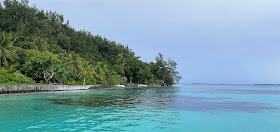 |
| Louisiade White-eye |
On the return leg of our cruise to Papua New Guinea we stopped for the day on February 3 in the Conflict Islands, a chain of small islands that are part of the Louisiade Archipelego. The Louisiades extend from the south-eastern end of PNG where the Coral Sea meets the Solomon Sea.
They have several endemic bird species and four of these (plus two future splits) occur in the Conflict Islands. We were moored off Panasesa, the largest of the Conflict group, and transferred by tender boat from the Coral Princess to an island wharf. A path from the jetty crosses the island, passing through rainforest.
The Conflict Islands are privately owned by an Australian businessman, which seems an incongruous state of affairs for such a scenically spectacular destination. It appears that nobody is resident here and that people are brought in when a cruise ship is berthed. Native artefacts were absurdly expensive, and many passengers had been denied the opportunity to acquire much cheaper souvenirs a day earlier on Kiriwina Island to the north when the captain decided not to land there.
Panasesa may be the largest in the group, but the island can be walked around and across within a couple of hours. I spent an enjoyable and productive morning here in lush rainforest and along beautiful beaches, scoring all 6 specialties. I had not left the jetty upon arrival when I saw my first White-chinned Myzomela (below) endemic to the Louisiades, and there were plenty of these rather drab honeyeaters about.
Next off the list was Louisiade White-eye (below) the commonest bird on the island and all over the place in noisy little flocks, often associating with the myzomelas.
The recently split Islet Kingfisher (below) with its distinctive call could be heard easily enough but it took some tracking to eventually locate a pair.
Last of the endemics was a Louisiade Whistler, with a male showing well but briefly, with one poor image having to do.
The distinctive subspecies of Spectacled Monarch and White-bibbed Fruit-Doves also showed nicely.
.jpg) |
| Spectacled Monarch |
.jpg) |
| White-bibbed Fruit-Dove |
Other nice birds included numbers of Island (Floury) Imperial-Pigeons.
 |
| Island Imperial-Pigeon |
SPECIES (* denotes lifer):
Black-naped Tern, Brown Noddy, Crested Tern, Ruddy Turnstone, Grey Plover (the last two species I didn’t see but they were photographed by Colin Palethorpe),
Lesser Frigatebird, Great Frigatebird,
Eastern Reef Heron, White-bellied Sea-Eagle, White-bibbed Fruit-Dove (subsp strophium),
Island (Floury) Imperial-Pigeon, *Islet Kingfisher,
Singing Starling, Spectacled Monarch (2 subsp melanopterus), Willie Wagtail, *Louisiade Whistler, *Louisiade White-eye, *White-chinned Myzomela.
Total 18 species (4 lifers)
 |
| Black-naped Tern |
.jpeg)








No comments:
Post a Comment